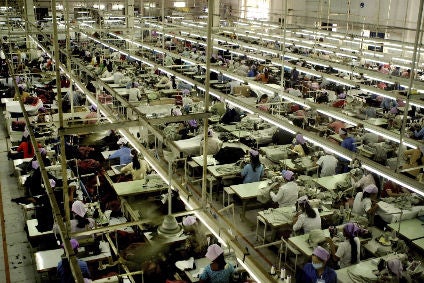
The Clean Clothes Campaign (CCC) has launched a website giving garment workers, activists and consumers access to real data on where clothing was made and the working conditions in which it was produced.
The Fashion Checker website offers access to the supply chains of some of the largest apparel brands, including Primark, Bestseller and Topshop, CCC says.
The organisation will use data on the website to put pressure on brands and policymakers to implement living wages for all workers in the garment industry by 31 December 2022.
As demand for ethical and sustainable fashion has increased, brands have responded with large-scale marketing campaigns and engaging sustainability reports. At the same time, CCC says brands have continued to ruthlessly seek lower prices for goods, forcing suppliers to operate on narrow profit margins and squeezing the wages of workers who are already living on the poverty line. It also points to a lack of transparency impeding workers’ ability to demand fair pay.
“Companies refuse to disclose information on their supply-chain because that would mean associating themselves with the poverty wages that the workers who make their branded projects receive,” says Muriel Treibich, Clean Clothes Campaign. “This lack of accountability needs to change and this is why we urgently need accurate and up-to-date data on factories and wages paid across the supply-chain.”
Information published on the website will include details about workers’ wages, including how gender and migration status intersect with pay levels and working conditions.

US Tariffs are shifting - will you react or anticipate?
Don’t let policy changes catch you off guard. Stay proactive with real-time data and expert analysis.
By GlobalDataAs well as providing information for consumers and activists, the Clean Clothes Campaign is also publishing a list of demands for brands and policymakers. Key demands include the commitment to use transparent and robust living wage benchmarks, and advance mandatory human rights due diligence within supply chains.
Despite an increase in transparency in recent years, campaigners are calling on brands and policymakers to publish more data and accelerate the pace at which they implement transparency in supply chains.
Under the UN guiding principles on Business and Human Rights, brands are obligated to run their businesses responsibly, however, in 2020 CCC says garment workers are still fighting for their basic human rights to be met.
The website initially includes data from a survey of 108 brands and direct interviews with hundreds of workers in five garment-producing countries. As the Fashion Checker project continues, the data-set will expand to include more information submitted by garment workers and labour rights activists.
“Brands must stop hiding their supply chains,” says Paul Roeland, Clean Clothes Campaign. “Their clothes are made by real people, in real locations. Consumers deserve to know where, and under what circumstances, clothes are produced.”



